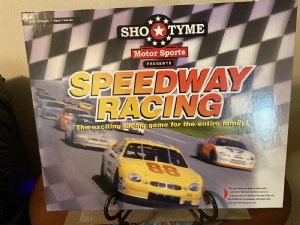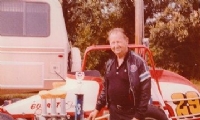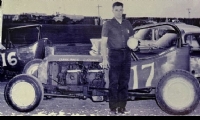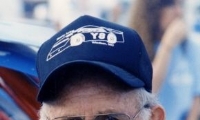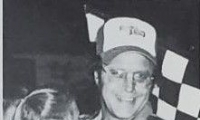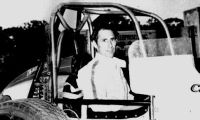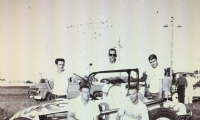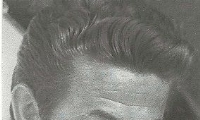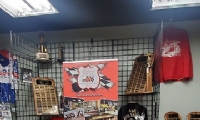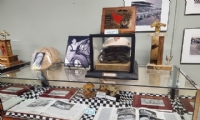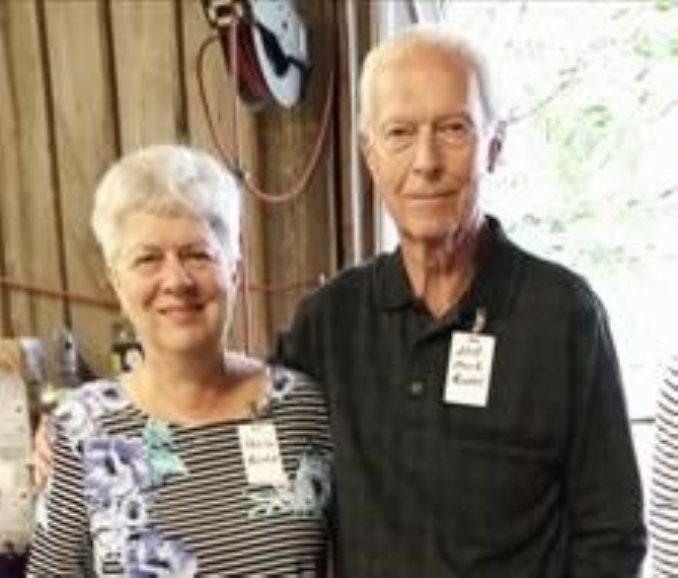
by Ray Cunningham (Kansas City, MO) -- On Wednesday afternoon one of the all-time greats of the Heartland racing scene Mark Randol died at age 79. Over the decades Randol would become involved in the sport in one form or another from the 1940’s on as a fan, crew member, mechanic, driver, owner, and a restoration expert of racing machines. Just some of the many hats he would wear in the racing world for over 70 years.
After World War II ended and the ban on racing was lifted, five-year old Mark Randol saw midget races at Olympic Stadium in 1946 while also becoming an expert at throwing “mud balls” after dirt would fly into the third turn grandstands where he sat with his family at the former baseball field. During 1946 his father Tom did some excavation work on the legendary facility located just a few miles east of downtown as well.
In the early 1950’s the Randol family went from fans of the “Mighty Midgets of KC” to owning a car previously ran by stalwart Jimmy Campbell. Though Mark was still to young too be involved in the pits at that time, he did however develop a love for the sport that would carry over as he graduated from being a fan to participating by the end of the decade.
Meanwhile, racing his number #5 Kurtis Kraft Midget with Offenhauser power, Father Tom Randol solicited the services of driver Bob Slater. The duo would take the 1951 KCMARA Midget Championship winning four races at Olympic, including a 75 lapper. And one at Riverside Stadium in North KC on the way to the championship.
In 1952 Tom Randol would sell the midget and move on to run IMCA Big Cars for the rest of the decade, winning with his new Kurtis Kraft Offenhauser Sprint Car #5 with drivers that included first Slater, and later Mac McHenry, Vito Calia, Jud Larson, Bill Chennault, and Hershel Wagner. While during the 1958 race season, Mark at age 17 would travel and crew for his dad for the first time on his trips across the IMCA sprint car circuit.
The 1959 season would be a last hurrah for Tom Randol as an owner. It came to an abrupt end at Belleville in August after Carl Williams spectacularly crashed the KK out of the park at the High Banks during an IMCA showdown there, and featured Tom Randol telling his teenage son to “Go see if he (Williams) was still alive!” Mark high tailed it over the banks to find Williams had already scrambled out of the damaged racer.
Carl Williams escaped in one piece at Belleville on that day and went on to a great career driving in sprints, midgets, and Indy Cars. Tom Randol, upon returning from The High Banks, sold one of the few Kurtis Kraft Sprints ever built, never racing again.
Mark Randol would start working at General Motors in 1959, and at age 18 would drive and own a modified that he would race at Riverside the following year in 1960. Though his career as a driver was short, he did receive rookie honors that season at the North Kansas City facility.
As a young man Randol would also become friends with Jerry Weld and his father Taylor “Pappy” Weld after the Welds moved into his neighborhood. Over the years Randol would become close with other Weld family members as well including Jerry’s brothers Greg and Kenny. Hanging out at Taylor Welds shop, Randol would learn a lot about race cars from the Welds while also developing a friendship with Weld family friend Ted Hall.
In 1963 Mark would become a valuable member of Greg Weld's race team along with Ted Hall as they dominated super modified racing in the Heartland. With 19-year-old Greg behind the wheel of his Roadster Styled Super, the young race team would win the Knoxville Nationals as well. Mark would also assist Greg’s brother Kenny when he won the 1964 and 1965 Knoxville Nationals driving for his father Pappy.
For 1965 after great success in the super modified ranks, Greg Weld would buy a traditional sprint car from Clem Tebow that was built by Willie Davis. And with Ted and Mark in tow, the trio would take on the USAC Sprint division that included competitors and future hall of famers AJ Foyt, Don Branson, Jud Larson, and Roger McCluskey.
During the season, the KC race team was very impressive, and by the end of the campaign Greg Weld would come within 2.5 points of winning his first USAC Sprint title at age 21 before narrowly losing to Johnny Rutherford for the championship.
In 1966 Ted Hall would build and race his own car with Mark being involved. During that spectacular season with Jay Woodside behind the wheel, the Kansas City race team would win many events including the Knoxville Nationals, and the BCRA Championship.
As the 1960’s came to close, Randol would join his buddies Greg Weld and Ted Hall once again to run Greg's version of the “Mechanical Rabbit Roadster” to a third-place finish in USAC Sprint points in 1968. With Weld finishing behind only Champ Larry Dickson and Gary Bettenhausen for the title.
After hanging out at Grant Kings shop in Indy with Greg and Ted in 1969. Mark would become a crew member in Indy Car racing with teams that included Andy Granatelli and Roger Penske over most of the next decade, adding yet another chapter to his ever-increasing racing resume.
In 1969, Mark would crew for former Randol sprint car team driver Carl Williams at the Indy 500. And in 1970, he would be a member of Greg Weld's team at the Brickyard. While later Randol would crew for Steve Krisiloff and Tom Sneva during their bids for the Borg-Warner Trophy in 1972-74, and crew for Bobby Allison, Sneva, and Mario Andretti from 1975-1977.
During the 1970’s, Mark would also return to his roots in the Kansas City area, helping the super modified efforts of his nephew Mike Randol to Rookie of the Year honors at Riverside Stadium in 1971. in 1972, with Dale Moore behind the wheel of his nephew's machine, the team would win the Missouri State Championship race at Sedalia.
Expanding his horizons to other racing related activities late in the 1970’s, Randol would own and operate a RC Track and Hobby Store from the late 1970’s into the 1990’s. While racing radio-controlled cars across the nation.
In the late 1990’s Mark would return to conventional racing to run with the USAC’s Silver Crown Division as a crew member. While winning a race working with Ted Hall in the pits on a car driven by Johnny “Hot Rod” Heydenreich to his first Silver Crown win on the pavement at Colorado Springs in 1998. And from 2000-2002 Mark would become a owner in the division running with drivers that included Robby Flock, Carl Edwards, and Kurt Michaels, at traditional venues for the dirt cars that included the Indy Fairgrounds, DuQuoin, Syracuse, and Springfield.
In the new millennium Randol would become involved in the restoration and replication of famous open wheel race cars, starting with his father’s Kurtis Kraft Sprint Car restored in honor of his late father Tom, and brother Don.
While also teaming up with fellow KC racing Craftsman John Layne on projects that included replicating Greg Welds 1963 Roadster Super Modified. Greg’s 1967 USAC Championship Sprint Car. The Joe Saldana “Mechanical Rabbit” Roadster. (One of 4 cars done for Bill Smith, and his Museum of American Speed.) The Joe Saldana Red Baron Sprint Car built out of Roger Becks shop originally. And two 4x replicants for Bill Smith, including his 1960 Sedan Ford Modified, and his 1965 Weld Style Roadster Super, both driven by Lloyd Beckman originally. As well as the restoration of the Central Excavating Special Indy Car, driven by Bill Vukovich and Rodger Ward in the 1950’s. Once again for the Museum of American Speed in Lincoln.
A member of the Kansas City racing fraternity for many years, Randol with his wife Sheila, would attend area events annually that included the CARB HOF (which he was enshrined in as a inductee in 2015) and the Layne BBQ hosted by his partner John Layne each fall.
And upon his Induction into the CARB HOF he gave special thanks to many of his close associates over the years that included Sam Helmuth, John and Bobby Layne, Ted Hall, and the entire Weld Family, among others.
Mark Randol’s involvement in racing crossed the generations and was significant in many ways. He will be dearly missed by his family, including wife Sheila, and by his many friends, across the greater racing community.

